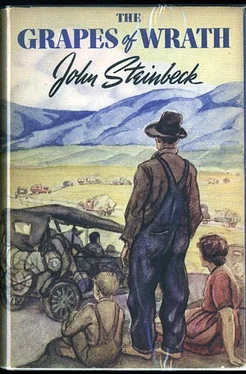John Steinbeck - The Grapes of Wrath
Здесь есть возможность читать онлайн «John Steinbeck - The Grapes of Wrath» весь текст электронной книги совершенно бесплатно (целиком полную версию без сокращений). В некоторых случаях можно слушать аудио, скачать через торрент в формате fb2 и присутствует краткое содержание. Город: New York, Год выпуска: 1939, Издательство: The Viking Press-James Lloyd, Жанр: Классическая проза, на английском языке. Описание произведения, (предисловие) а так же отзывы посетителей доступны на портале библиотеки ЛибКат.
- Название:The Grapes of Wrath
- Автор:
- Издательство:The Viking Press-James Lloyd
- Жанр:
- Год:1939
- Город:New York
- ISBN:нет данных
- Рейтинг книги:5 / 5. Голосов: 1
-
Избранное:Добавить в избранное
- Отзывы:
-
Ваша оценка:
- 100
- 1
- 2
- 3
- 4
- 5
The Grapes of Wrath: краткое содержание, описание и аннотация
Предлагаем к чтению аннотацию, описание, краткое содержание или предисловие (зависит от того, что написал сам автор книги «The Grapes of Wrath»). Если вы не нашли необходимую информацию о книге — напишите в комментариях, мы постараемся отыскать её.
The Grapes of Wrath — читать онлайн бесплатно полную книгу (весь текст) целиком
Ниже представлен текст книги, разбитый по страницам. Система сохранения места последней прочитанной страницы, позволяет с удобством читать онлайн бесплатно книгу «The Grapes of Wrath», без необходимости каждый раз заново искать на чём Вы остановились. Поставьте закладку, и сможете в любой момент перейти на страницу, на которой закончили чтение.
Интервал:
Закладка:
Whenever he could, he put a hand on her or stood close, so that his body touched her at hip and shoulder, and he felt that this kept a relation that might be departing. He was a sharp-faced, lean young man of a Texas strain, and his pale blue eyes were sometimes dangerous and sometimes kindly, and sometimes frightened. He was a good hard worker and would make a good husband. He drank enough, but not too much; fought when it was required of him; and never boasted. He sat quietly in a gathering and yet managed to be there and to be recognized.
Had he not been fifty years old, and so one of the natural rulers of the family, Uncle John would have preferred not to sit in the honor place beside the driver. He would have liked Rose of Sharon to sit there. This was impossible, because she was young and a woman. But Uncle John sat uneasily, his lonely haunted eyes were not at ease, and his thin strong body was not relaxed. Nearly all the time the barrier of loneliness cut Uncle John off from people and from appetites. He ate little, drank nothing, and was celibate. But underneath, his appetites swelled into pressures until they broke through. Then he would eat of some craved food until he was sick; or he would drink jake or whisky until he was a shaken paralytic with red wet eyes; or he would raven with lust for some whore in Sallisaw. It was told of him that once he went clear to Shawnee and hired three whores in one bed, and snorted and rutted on their unresponsive bodies for an hour. But when one of his appetites was sated, he was sad and ashamed and lonely again. He hid from people, and by gifts tried to make up to all people for himself. Then he crept into houses and left gum under pillows for children; then he cut wood and took no pay. Then he gave away any possession he might have: a saddle, a horse, a new pair of shoes. One could not talk to him then, for he ran away, or if confronted hid within himself and peeked out of frightened eyes. The death of his wife, followed by months of being alone, had marked him with guilt and shame and had left an unbreaking loneliness on him. But there were things he could not escape. Being one of the heads of the family, he had to govern; and now he had to sit on the honor seat beside the driver.
The three men on the seat were glum as they drove toward home over the dusty road. Al, bending over the wheel, kept shifting eyes from the road to the instrument panel, watching the ammeter needle, which jerked suspiciously, watching the oil gauge and the heat indicator. And his mind was cataloguing weak points and suspicious things about the car. He listened to the whine, which might be the rear end, dry; and he listened to tappets lifting and falling. He kept his hand on the gear lever, feeling the turning gears through it. And he had let the clutch out against the brake to test for slipping clutch plates. He might be a musking goat sometimes, but this was his responsibility, this truck, its running, and its maintenance. If something went wrong it would be his fault, and while no one would say it, everyone, and Al most of all, would know it was his fault. And so he felt it, watched it, and listened to it. And his face was serious and responsible. And everyone respected him and his responsibility. Even Pa, who was the leader, would hold a wrench and take orders from Al.
They were all tired on the truck. Ruthie and Winfield were tired from seeing too much movement, too many faces, from fighting to get licorice whips; tired from the excitement of having Uncle John secretly slip gum into their pockets.
And the men in the seat were tired and angry and sad, for they had got eighteen dollars for every movable thing from the farm: the horses, the wagon, the implements, and all the furniture from the house. Eighteen dollars. They had assailed the buyer, argued; but they were routed when his interest seemed to flag and he had told them he didn’t want the stuff at any price. Then they were beaten, believed him, and took two dollars less than he had first offered. And now they were weary and frightened because they had gone against a system they did not understand and it had beaten them. They knew the team and the wagon were worth much more. They knew the buyer man would get much more, but they didn’t know how to do it. Merchandising was a secret to them.
Al, his eyes darting from road to panel board, said, “That fella, he ain’t a local fella. Didn’ talk like a local fella. Clothes was different, too.”
And Pa explained, “When I was in the hardware store I talked to some men I know. They say there’s fellas comin’ in jus’ to buy up the stuff us fellas got to sell when we get out. They say these new fellas is cleaning up. But there ain’t nothin’ we can do about it. Maybe Tommy should of went. Maybe he could of did better.”
John said, “But the fella wasn’t gonna take it at all. We couldn’t haul it back.”
“These men I know told about that,” said Pa. “Said the buyer fellas always done that. Scairt folks that way. We jus’ don’t know how to go about stuff like that. Ma’s gonna be disappointed. She’ll be mad an’ disappointed.”
Al said, “When ya think we’re gonna go, Pa?”
“I dunno. We’ll talk her over tonight an’ decide. I’m sure glad Tom’s back. That makes me feel good. Tom’s a good boy.”
Al said, “Pa, some fellas was talkin’ about Tom, an’ they says he’s parole’. An’ they says that means he can’t go outside the State, or if he goes, an’ they catch him, they send ’im back for three years.”
Pa looked startled. “They said that? Seem like fellas that knowed? Not jus’ blowin’ off?”
“I don’t know,” said Al. “They was just a-talkin’ there, an’ I didn’t let on he’s my brother. I jus’ stood an’ took it in.”
Pa said, “Jesus Christ, I hope that ain’t true! We need Tom. I’ll ask ’im about that. We got trouble enough without they chase the hell out of us. I hope it ain’t true. We got to talk that out in the open.”
Uncle John said, “Tom, he’ll know.”
They fell silent while the truck battered along. The engine was noisy, full of little clashings, and the brake rods banged. There was a wooden creaking from the wheels, and a thin jet of steam escaped through a hole in the top of the radiator cap. The truck pulled a high whirling column of red dust behind it. They rumbled up the last little rise while the sun was still half-face above the horizon, and they bore down on the house as it disappeared. The brakes squealed when they stopped, and the sound printed in Al’s head—no lining left.
Ruthie and Winfield climbed yelling over the side walls and dropped to the ground. They shouted, “Where is he? Where’s Tom?” And then they saw him standing beside the door, and they stopped, embarrassed, and walked slowly toward him and looked shyly at him.
And when he said, “Hello, how you kids doin’?” they replied softly, “Hello! All right.” And they stood apart and watched him secretly, the great brother who had killed a man and been in prison. They remembered how they had played prison in the chicken coop and fought for the right to be prisoner.
Connie Rivers lifted the high tail-gate out of the truck and got down and helped Rose of Sharon to the ground; and she accepted it nobly, smiling her wise, self-satisfied smile, mouth tipped at the corners a little fatuously.
Tom said, “Why, it Rosasharn. I didn’t know you was comin’ with them.”
“We was walkin’,” she said. “The truck come by an’ picked us up.” And then she said, “This is Connie, my husband.” And she was grand, saying it.
The two shook hands, sizing each other up, looking deeply into each other; and in a moment each was satisfied, and Tom said, “Well, I see you been busy.”
She looked down. “You do not see, not yet.”
Читать дальшеИнтервал:
Закладка:
Похожие книги на «The Grapes of Wrath»
Представляем Вашему вниманию похожие книги на «The Grapes of Wrath» списком для выбора. Мы отобрали схожую по названию и смыслу литературу в надежде предоставить читателям больше вариантов отыскать новые, интересные, ещё непрочитанные произведения.
Обсуждение, отзывы о книге «The Grapes of Wrath» и просто собственные мнения читателей. Оставьте ваши комментарии, напишите, что Вы думаете о произведении, его смысле или главных героях. Укажите что конкретно понравилось, а что нет, и почему Вы так считаете.











